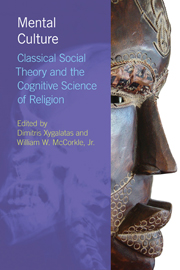Book contents
- Frontmatter
- Contents
- List of illustrations
- Contributors
- 1 Introduction: social minds, mental cultures – weaving together cognition and culture in the study of religion
- 2 Explanatory pluralism and the cognitive science of religion: why scholars in religious studies should stop worrying about reductionism
- 3 Early cognitive theorists of religion: Robin Horton and his predecessors
- 4 The opium or the aphrodisiac of the people? Darwinizing Marx on religion
- 5 Immortality, creation and regulation: updating Durkheim's theory of the sacred
- 6 Non-ordinary powers: charisma, special affordances and the study of religion
- 7 Malinowski's magic and Skinner's superstition: reconciling explanations of magical practices
- 8 Towards an evolutionary cognitive science of mental cultures: lessons from Freud
- 9 Piaget on moral judgement: towards a reconciliation with nativist and sociocultural approaches
- 10 Building on William James: the role of learning in religious experience
- 11 Explaining religious concepts: Lévi-Strauss the brilliant and problematic ancestor
- 12 The meaningful brain: Clifford Geertz and the cognitive science of culture
- 13 Cognitive science and religious thought: the case of psychological interiority in the Analects
- 14 Conclusion: moving towards a new science of religion; or have we already arrived?
- Bibliography
- Index
14 - Conclusion: moving towards a new science of religion; or have we already arrived?
- Frontmatter
- Contents
- List of illustrations
- Contributors
- 1 Introduction: social minds, mental cultures – weaving together cognition and culture in the study of religion
- 2 Explanatory pluralism and the cognitive science of religion: why scholars in religious studies should stop worrying about reductionism
- 3 Early cognitive theorists of religion: Robin Horton and his predecessors
- 4 The opium or the aphrodisiac of the people? Darwinizing Marx on religion
- 5 Immortality, creation and regulation: updating Durkheim's theory of the sacred
- 6 Non-ordinary powers: charisma, special affordances and the study of religion
- 7 Malinowski's magic and Skinner's superstition: reconciling explanations of magical practices
- 8 Towards an evolutionary cognitive science of mental cultures: lessons from Freud
- 9 Piaget on moral judgement: towards a reconciliation with nativist and sociocultural approaches
- 10 Building on William James: the role of learning in religious experience
- 11 Explaining religious concepts: Lévi-Strauss the brilliant and problematic ancestor
- 12 The meaningful brain: Clifford Geertz and the cognitive science of culture
- 13 Cognitive science and religious thought: the case of psychological interiority in the Analects
- 14 Conclusion: moving towards a new science of religion; or have we already arrived?
- Bibliography
- Index
Summary
The editors of this volume suggest that cognitive science of religion (CSR) is maturing into a coherent field defined by a common assumption that the workings of the mind must be attended to in scholarly research. The editors' views about the emergence of a coherent research programme of CSR may, however, be somewhat overly optimistic.
Despite the common assumption by CSR researches that the workings of the mind must be attended to in the study of religion, which does offer some constraint upon the approaches employed, the field of CSR has, nevertheless, been developing as a number of somewhat different research programmes. Because of the differing methodological and theoretical emphases of these programmes, the concept “cognitive science of religion” more often serves as an umbrella term for a diversity of research agendas and strategies than for a coherent field of study. In addition to the “standard model” of CSR (Boyer 2005), for example, there is the adaptationist programme of religion represented by the journal Religion, Brain and Behavior (see Wilson 2008; Sosis 2009; Schloss & Murray 2011) and the “Aarhus school”, that is, the Religion, Cognition and Culture Research Unit (RCC) established in 2004 by Armin W. Geertz and Jeppe Sinding Jensen (A. W. Geertz 2008, 2010; Schjoedt 2009), which emphasizes the role of culture for human cognition.
- Type
- Chapter
- Information
- Mental CultureClassical Social Theory and the Cognitive Science of Religion, pp. 213 - 226Publisher: Acumen PublishingPrint publication year: 2013

